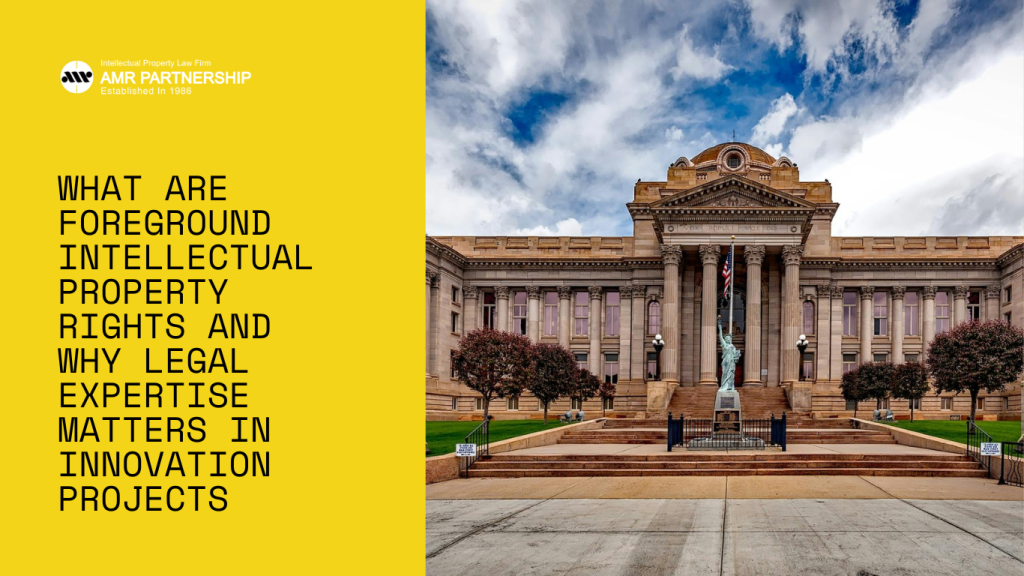
What are foreground intellectual property rights? This question has become increasingly important in today’s innovation-driven economy. Foreground IP refers to intellectual property that is generated during collaborative research and development projects. Whether developed through joint ventures, government-funded programs, or partnerships with academic institutions, these rights must be clearly defined and carefully managed to avoid legal disputes. Without proper legal expertise, businesses risk losing control of their most valuable assets. That’s why expert legal firms like AMR Partnership play a crucial role in safeguarding IP interests from the outset.
Defining Foreground Intellectual Property Rights
Foreground Intellectual Property Rights, or Foreground IP, refer to any IP that is created during the execution of a project. This term is often used in legal and commercial agreements, particularly in the context of innovation projects, collaborations, and research grants. Unlike pre-existing IP (known as Background IP), Foreground IP emerges as a result of joint efforts, discoveries, and innovations that occur throughout the lifecycle of a project.
Foreground IP includes a wide range of intellectual assets such as patents, software, databases, designs, and even trade secrets. When multiple parties collaborate on a project, questions arise: who owns the outcomes? Who can exploit the results? Can the parties commercialize the new knowledge independently?
The complexity of these questions underscores the need for clear contractual terms and experienced legal guidance. Without them, projects can quickly devolve into disputes, derailing innovation and causing financial and reputational damage. A trusted IP law firm like AMR Partnership ensures all aspects of Foreground IP are correctly addressed from the beginning.
Read more: What Are Included in Intellectual Property? A Comprehensive List for Businesses and Creators
Background IP vs. Foreground IP: Key Differences
To fully understand what are Foreground Intellectual Property Rights, one must distinguish them from Background IP. Background IP refers to intellectual property that is brought into a project by one or more participants. This includes previously developed software, patents, trade secrets, or any other IP that predates the collaboration.
Foreground IP, on the other hand, arises directly from the project itself. The main challenge often lies in how Foreground and Background IP interact, especially in collaborative environments such as university-industry partnerships or international R&D programs.
For example, if Company A provides Background IP in the form of a patented algorithm and Company B develops a new software tool based on it, questions arise about which components belong to whom. This is precisely where AMR’s services such as IP clause drafting and negotiation come in.
Proper legal mechanisms are essential to:
- Prevent overlap between Foreground and Background IP.
- Define boundaries of usage rights.
- Prevent future litigation.
With decades of experience, AMR Partnership helps ensure that your innovations remain secure and compliant, whether dealing with Industrial Design protections, Trade Secret enforcement, or Commercial Services for exploitation of IP assets.
Read more: What Are Considered Intellectual Property? Understand the Scope of IP Protection
Where Foreground IP Typically Arises
Foreground Intellectual Property commonly emerges in scenarios that require cross-functional or cross-organizational cooperation. These include:
1. Government-Funded Research Programs
Such programs often involve multiple institutions—universities, research centers, and private enterprises. Without clear terms, disputes can arise over the commercialization of outcomes developed under taxpayer funding.
2. Joint Ventures (JVs)
Many companies form JVs to reduce R&D risks and expenses. However, without prior agreements on Foreground IP ownership, later revenue sharing and technology transfer can become contentious.
3. Collaborative University Projects
When students or academic staff co-develop a prototype with external businesses, determining whether the IP is university-owned, individually owned, or jointly owned is essential.
In each of these contexts, having the right legal framework is vital. AMR Partnership works closely with project stakeholders to define IP ownership at every stage. They ensure that innovations born out of joint efforts don’t lead to joint disputes.
Through careful documentation, IP audits, and prior art searches, AMR supports institutions in proactively managing their intellectual capital.
Read more: Who Governs Intellectual Property Rights in Indonesia? Key Authorities, Regulations, and Their Roles
Legal Risks of Poorly Managed Foreground IP
Failing to manage Foreground IP correctly can result in significant legal and commercial risks. One major concern is ambiguous joint ownership. Without detailed clauses specifying rights, obligations, and licensing permissions, collaborators may find themselves in costly legal battles.
Some of the most common risks include:
- Infringement claims by one party over the other’s use of jointly developed IP.
- Loss of commercialization opportunities due to unresolved ownership rights.
- Reduced investor confidence due to unclear IP portfolios.
- Potential breach of government grant conditions, leading to funding clawbacks.
By engaging with a trusted IP law firm like AMR, organizations can:
- Avoid disputes through preventive legal architecture.
- Assign ownership in a way that aligns with each party’s contributions.
- Implement licensing models that unlock value without legal friction.
AMR’s services cover not just IP creation but also enforcement—including Litigation, Plant Variety Protection, and Geographical Indication support. Their in-depth legal foresight helps ensure that innovation is nurtured and protected from day one.
Read more: When Was Intellectual Property Law Enacted in Indonesia? History and Development
How AMR Partnership Adds Value to IP Strategy
The value of a specialist law firm becomes apparent in every stage of Foreground IP development. At AMR Partnership, legal professionals collaborate with inventors, research directors, and business stakeholders to integrate legal compliance into innovation strategies.
Drafting IP Clauses
Contractual clarity is critical. AMR provides customized IP clauses for:
- Research collaboration agreements
- Joint development contracts
- Non-disclosure agreements (NDAs)
- Licensing and technology transfer documents
These clauses define which party owns what, how licensing operates, and what happens to the IP post-project.
Negotiating IP Ownership
Conflicting interests between collaborators often hinder project execution. AMR mediates ownership negotiations, ensuring all parties get fair treatment based on input, resources, and technical contribution.
Licensing & Commercialization
Turning Foreground IP into commercial success requires structured licensing. AMR provides guidance on:
- Exclusive vs. non-exclusive licenses
- Royalty agreements
- Territory-based commercialization rights
By leveraging their experience with IC Layout Design, Copyright, and Patent protections, AMR helps clients scale their innovations without the fear of infringement or misappropriation.
Read more: What Is the Name of the Patent Office in Indonesia? Functions, Services, and How to Contact Them
Extending Protection to Cross-Border Collaborations
As Indonesian innovation becomes more globally connected, Foreground IP generated through international collaborations must be managed according to multi-jurisdictional laws. This introduces new legal complexities:
- Different IP laws across countries
- Conflicting IP registration rules
- Cross-border enforcement issues
AMR Partnership, with its global network spanning 70+ countries, is uniquely positioned to handle international IP strategy. Whether registering a Patent globally or enforcing a Trade Secret across borders, AMR ensures seamless compliance.
They also help local clients navigate international collaborations by translating complex agreements into actionable legal protections.
Read more: What Are the Forms of Intellectual Property You Should Know About in 2025?
Why Companies Should Partner with AMR Partnership
Choosing the right legal partner for IP management is not just about compliance—it’s about competitive advantage. Foreground IP represents the tangible output of innovation, and its mishandling can devalue entire projects.
Here’s why AMR is the go-to firm:
- Established in 1986 with decades of experience
- Trusted by government, universities, and enterprises
- Full-spectrum IP services including Commercial Services and Litigation
- Tailored approach for each client’s innovation lifecycle
Don’t leave your most valuable assets unprotected. Ensure your innovation journey is secure and profitable by consulting with AMR. Visit us now to learn how we can support your IP strategy.
For more information about AMR Partnership, feel free to contact us:
- Phone (Hunting): +62-21-29036668
- Fax: +62-21-29036672 to 75
- WhatsApp Customer Service: Click here to chat
- Instagram: @amrpartnership
- TikTok: @amr.partnership
- Facebook: Law Firm AMR Partnership
- Official Website: www.amr.co.id






